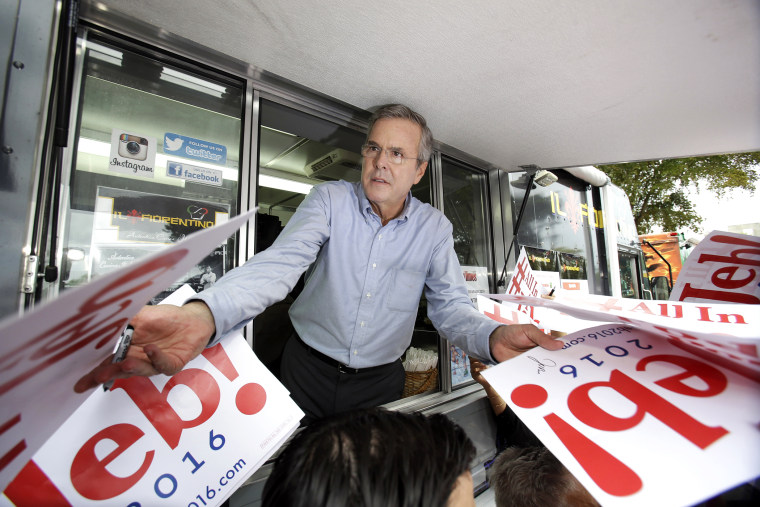There was quite a bit to chew on in Jeb Bush's official
kickoff speech yesterday. It was hard not to marvel, for example, at the son and brother of former presidents complaining about the D.C. "elites." I was also surprised his speechwriters included complaints about lobbyists in light of the former governor's
extensive lobbying ties.
And don't even get me started on Bush telling his audience, "The presidency should not be passed on from one liberal to the next."
But perhaps the most curious rhetoric, at least on a substantive level, was
this:
"So many challenges could be overcome if we just get this economy growing at full strength. There is not a reason in the world why we cannot grow at a rate of four percent a year. And that will be my goal as president -- four percent growth, and the 19 million new jobs that come with it."
I'm going to assume that the "19 million new jobs" target would cover two terms in the White House, since no one, not even Bill Clinton, has ever come close to such a total in four years.
There are two broad problems with Jeb's ambitious goal. The first is how unrealistic it is; the second is how little credibility he has on the issue.
On the former, the
New York Times' Neil Irwin
notes that 4% GDP growth is vastly more difficult than Bush may realize.
[S]imple math suggests the next president is unlikely to see sustained 4 percent G.D.P. growth absent a remarkable, rapid upward shift in the nation's productive capacity. [...] [F]or 4 percent growth to be realistic in the next presidential term -- not just for a one-quarter spurt but on a sustained basis -- one of two things must apply. Either the technocrats at places like the C.B.O. and the Fed must be wildly underestimating the nation's growth potential today. Or a revolution in American productivity must be on the way. Neither of those are things that a president has much control over.
Tim Noah
talked to some economists about whether 4% growth is realistic. Take a wild guess what they said. "There is not a reason in the world why we cannot grow at a rate of four percent a year"? Actually, there are all kinds of reasons.
We might be able to make some projections about what Bush's economic plan would do if implemented, but at this point, he doesn't really have an economic plan. He has a goal -- Jeb recently said he's targeting 4% growth because 4 is "
a nice round number" -- but I'm afraid that's not quite the same thing.
But, Bush says, he has also has a proven track record. The Florida Republican was governor for two terms, and during his tenure, his state's economy saw significant growth. This proves, the argument goes, that Jeb knows what he's talking about -- he'll simply apply his winning formula to national policy.
The problem, whether Bush is prepared to admit it or not, is that Florida's economic growth during his two terms was the result of a housing bubble. In fact, Paul Krugman accurately
described it as "the mother of all housing bubbles -- and when the bubble burst (luckily for Jeb! just after he left office) it promptly wiped out 900,000" of the 1.3 million jobs created when Bush was in the governor's office.
Obviously, Florida's housing bubble wasn't Bush's fault. But it's equally irresponsible for the Republican to suggest he was somehow responsible for the great results created by an overly inflated market.
The truth is, Bush had it rather easy -- the housing bubble filled state coffers and helped the state economy soar. He took the credit, left office before the crash, and now wants to be seen as some kind of economic genius.
Reality tells a very different kind of story.
